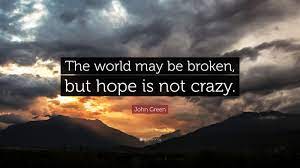The World May Be Broken, but Hope Is Not Crazy
Introduction
The world is a complex place, full of challenges and obstacles that can make it feel like everything is falling apart. From the climate crisis to political polarization, it's easy to feel like there's no hope for the future. But even in the darkest of times, hope can be found. This article will explore the idea that the world may be broken, but hope is not crazy.
The Importance of Hope
Hope is a powerful force that can inspire us to keep moving forward, even when things seem impossible. It gives us the strength to face challenges and the resilience to bounce back from setbacks. Without hope, it's easy to become discouraged and give up on our dreams.
The World May Be Broken
There's no denying that the world is facing some serious challenges. Climate change is causing more frequent and severe natural disasters, while political divisions are making it difficult to find common ground on important issues. Poverty, inequality, and injustice continue to plague many parts of the world.
Finding Hope in the Darkness
Despite all of these challenges, it's important to remember that there is still hope. We can find it in the actions of individuals and organizations working to make a difference in the world. We can find it in the way communities come together to support one another in times of need. And we can find it in the resilience and strength of the human spirit.
The Power of Positive Thinking
Positive thinking can be a powerful tool in cultivating hope. By focusing on the good things in our lives and in the world around us, we can create a sense of optimism and possibility. This doesn't mean ignoring the challenges we face, but rather approaching them with a mindset of resilience and determination.
Taking Action for Change
Hope is not just a feeling - it's also an action. We can cultivate hope by taking steps to make a positive difference in the world. This might mean volunteering for a local charity, advocating for a cause we believe in, or simply treating others with kindness and compassion.
FAQs
Q: Is hope realistic in a world full of problems?
A: Yes, hope is realistic because it's a natural human response to adversity. Even in the darkest of times, people have found ways to persevere and make positive change in the world.
Q: How can I cultivate hope in my own life?
A: There are many ways to cultivate hope, including focusing on the good things in your life, practicing gratitude, and taking action to make a positive difference in the world.
Q: Can hope really make a difference in the world?
A: Yes, hope can make a big difference in the world. When we believe that positive change is possible, we're more likely to take action to make it happen.
Q: Is it possible to have hope in the face of overwhelming challenges?
A: Yes, it's possible to have hope even when faced with overwhelming challenges. By focusing on what we can control and taking positive action, we can cultivate a sense of optimism and possibility.
Q: What can we do to inspire hope in others?
A: We can inspire hope in others by leading by example, sharing stories of positive change, and offering encouragement and support.
Q: How can we stay hopeful in the face of setbacks and failures?
A: Staying hopeful in the face of setbacks and failures can be challenging, but it's important to remember that these setbacks are a natural part of the process of making positive change. By focusing on what we've learned and what we can do differently in the future, we can stay motivated and optimistic.
Conclusion
Certainly! In this article, we're exploring the idea that even though the world is facing serious challenges, there is still hope to be found. We've talked about the importance of hope and how it can inspire us to keep moving forward, even in difficult times.
We've also acknowledged that the world is broken in many ways, from the climate crisis to political polarization to poverty and inequality. But even in the midst of all this darkness, there are reasons to be hopeful.
One way to cultivate hope is through positive thinking. By focusing on the good things in our lives and in the world around us, we can create a sense of optimism and possibility. But hope is also an action - we can cultivate it by taking steps to make a positive difference in the world.
We've also addressed some common questions about hope, such as whether it's realistic in a world full of problems and how we can stay hopeful in the face of setbacks and failures.
Ultimately, the message of this article is that hope is a powerful force that can help us navigate the challenges of the world. By focusing on what's possible and taking positive action, we can make a difference and create a brighter future.




Comments